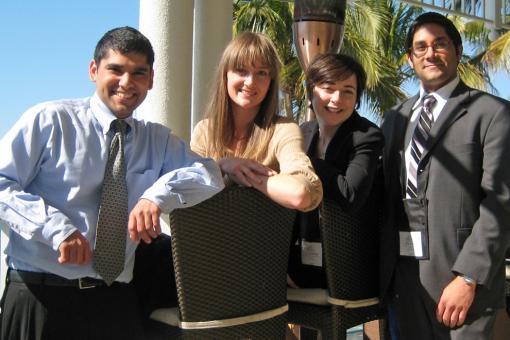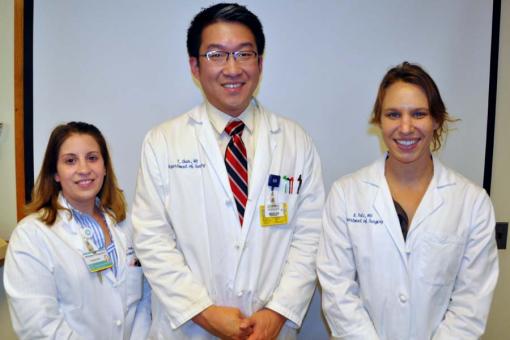Debolina Banerjee, MD |
7/2022 - 6/2024
|
Frank Sellke, MD |
Effects of Antidiabetic Agents on Vascular Reactivity and Flow Dynamics |
Dr. Banerjee's experiments aim to evaluate the effects of commonly prescribed antidiabetic agents on vascular reactivity and coronary flow. |
Cynthia Xu, MD |
7/2021 - 6/2023 |
Frank Sellke, MD |
Effects of Mesenchymal Stem Cell-Derived Extracellular Vesicles on Diabetic and Non-diabetic Human Coronary Artery Endothelial Cells |
Dr. Xu's research focuses on extracellular vesicles derived from human bone mesenchymal stem cells, and will attempt to determine the mechanisms by which they exert their therapeutic effects in in vitro, and small and large animal models of cardiovascular disease. |
| Emily Hensler, MD |
7/2020 - 6/2022 |
Alfred Ayala, PhD |
Role of the immune checkpoint regulator VISTA in neonatal sepsis |
Dr. Hensler's project focuses on how VISTA, an immune checkpoint regulator, modulates the immune response to a septic insult (cecal slurry) in neonatal mice, as well as how its activity affects survival. |
| Elizabeth Tindal, MD |
7/2019 - 6/2021 |
Alfred Ayala, PhD |
Evaluating selective deletion of check-point protein, PD-L1, in neutrophils as it compares to endothelial cells using specialized Cre-lox mice |
Dr. Tindal's research looks at the impact on shock/sepsis-induced mortality and systemic inflammation will be studied following the combined effect of hemorrhagic and septic (ie. cecal ligation and perforation) insults. |
| Michelle Wakeley, MD |
7/2019 - 6/2020 |
Alfred Ayala, PhD |
Checkpoint inhibitor protein modulation of immune dysregulation in neonatal sepsis |
Dr. Wakeley's research attempts to identify novel targets for treatment of septic immune dysregulation by focusing on the role of checkpoint inhibitor proteins and their ligands including PD-1, PDL-1, and HVEM in modulation of neonatal sepsis in mice. |
| Chelsey Ciambella, MD |
7/2018 - 6/2020 |
Jonathan Reichner, PhD |
Identification of a damaging subset of neutrophils that arises in septic patients |
Dr. Ciambella will investigate the role of a distinct subset of neutrophils on endothelial barrier function, disease severity and host survival. Her aim is to demonstrate these cells are a target for a therapeutic blockade that could benefit the septic host. |
| Joshua Cohen, MD |
7/2018 - 6/2020 |
Craig Lefort, PhD |
Investigating the role of neutrophil progenitor transplantation following hemorrhage in the prevention of ARDS |
Dr. Cohen aims to utilize the the mobilization of hematopoietic progenitor cells from the bone marrow following hemorrhage and trauma as conditioning for transplant of donor hematopoietic progenitor cells. His project's goal is to develop an off-the-shelf neutrophil progenitor cellular therapy for use in the acutely ill trauma patient |
| Roberto Cortez, MD |
7/2017 - 6/2019 |
Jack Elias, MD |
|
Dr. Cortez's goal is to further define the complex and important roles of chitinase-like protein (CLP) Chi3l1/YKL-40, PLSCR, and PD-1/PDL1 in relation to the pathogenesis of pulmonary fibrosis, asthma, inflammation, and lung cancer in the mouse model. With the advent of PD-1 antibody therapy to treat advanced melanoma, further developing an understanding for said pathways may allow for the continued development of novel immunotherapeutic options. |
| Laura Scrimgeour, MD |
7/2016 - 6/2018 |
Frank Sellke, MD |
|
Dr. Scrimgeour’s research focused on investigating treatments for chronic myocardial ischemia in a porcine model. Her research also involved injection of microvesicles isolated from stem cells to improve myocardial blood flow. |
| Catherine Dickinson, MD |
7/2015 - 6/2016 |
Jonathan Reichner, PhD |
|
Dr. Dickinson's research focused on neutrophils and their role in damaging the endothelial barrier in patients impacted by surgery, trauma, and sepsis. |
| Brittany Potz, MD |
7/2015 - 6/2017 |
Frank Sellke, MD |
|
Dr. Potz' focus was on the discovery of new medical therapies for coronary artery disease using a novel pig model of chronic myocardial ischemia in the setting of metabolic syndrome that translates to patients with CAD and their associated co-morbidities. |
| Noelle Hutchins, PhD |
7/2013 - 6/2014 |
Alfred Ayala, PhD, Jonathan Reichner, PhD |
|
Dr. Hutchins investigated how liver sinusoidal endothelial cells are affected during ALI in sepsis, and the potential mediators and/or signaling pathways involved. |
| Andrew Blakely, MD |
7/2012 - 6/2014 |
John Morgan, PhD |
|
Dr. Blakely's research involved using micromolded hydrogels to create complex microtissues, such as toroids and honeycombs. His focus was on analyzing the mechanical properties of these formed microtissues as well as looking at methods to perfuse the tissues in order to create larger tissues. |
| Elizabeth Fox, MD |
7/2011 - 6/2013 |
Jonathan Reichner, PhD |
|
Dr. Fox studied the regulation of the barrier function of an endothelial monolayer. Normally, the cells of an endothelial monolayer are in close proximity to each other, in order to keep cells and other components of blood in the intravascular space. In the setting of trauma and sepsis, the space between cells increases, resulting in decreased barrier function, and allowing neutrophils to arrive at a site of tissue damage or infection. Dr. Fox attempted to study the role of CAP37 in the regulation of monolayer integrity, specifically as it functions in the absence of neutrophils. Additionally, she evaluated the structure and function of neutrophils obtained from trauma and septic patients and their effect on endothelial resistance. |
| Sean Ciullo, MD |
7/2010 - 6/2012 |
Thomas Tracy, MD |
|
Ciullo's research focused on liver fibrosis and injury in a rat model of biliary obstruction. Dr. Ciullo's projects focused initially on the development of liver fibrosis over the time of bile duct ligation and then on attempting to activate intrinsic MMP-8 within the liver. To this end, Dr. Ciullo worked extensively with Dr. Reichner’s laboratory to better understand the physiology of neutrophils and what components of them are necessary to activate intrinsic MMP-8 within the liver. |
| Zachary Gregg, MD |
7/2009 - 6/2011 |
John Sedivy, PhD |
|
Gregg's research included elucidating the connections between, or the role of, cellular senescence in both tissue regeneration/wound healing and inflammation. |
| Samille Brancato, MD |
7/2008 - 6/2010 |
Jorge Albina, MD |
|
Brancato worked with Dr. Albina's lab to test the following hypothesis: 1. IL-1 directly modulates the development or stability of keloids and 2. IL-1 modulates the development or stability of keloids through IL-6. |
| Jill Johnstone, MD |
7/2007 - 6/2009 |
Jonathan Reichner, PhD |
|
Johnstone researched the requirements for VAV guanine nucleotide exchange factors in phagocytosis of zymosan and apoptotic bodies and the effect of sepsis on VAV-mediated host defense. Dr. Johnstone's goal was to determine the effects of sepsis on each phagocytic pathway with the consideration that they are differentially regulated and may not all be affected by sepsis in the same way. This was done in collaboration with Dr. Ayala and furthered the work of a previous Trauma Training resident, Dr. Ryan Swan, who found that sepsis impedes the uptake of apoptotic bodies by murine macrophages. |
| Gwendolyn Elphick, PhD |
7/2006 - 9/2008 |
Alfred Ayala, PhD |
|
Dr. Elphick explored the effects of activated protein C on leukocyte migration during sepsis in both humans and an animal model. Her specific area of interest was changes in integrin expression and activation during sepsis, and how APC regulates integrin mediated neutrophil migration and how it impacts disease outcome. |
| Ryan Swan, MD |
7/2005 - 6/2007 |
Alfred Ayala, PhD |
|
Dr. Swan researched the contribution of macrophage clearance of apoptotic cells to the pathophysiology of sepsis. A hallmark of sepsis in animal models and human studies is widespread immune cell apoptosis, which has been linked to increased morbidity and mortality. Macrophage phagocytosis of apoptotic immune cells leads to release of anti-inflammatory cytokines as a physiologic mechanism for controlling inflammation; however, in the setting of massive immune cell apoptosis as seen in sepsis, this process may contribute to the immunosuppressed state seen in septic patients. |
| Michael Connolly, MD |
7/2004 - 6/2006 |
Jorge Albina, MD |
|
Dr. Connolly's work concentrated primarily in developing techniques for laser capture microdissection/RNA extraction from murine wounds. As a result of this work, the laboratory now has at hand detailed protocols leading to the isolation of high purity RNA from wound macrophages. Additional work was conducted in collaboration with Dr. Minsoo Kim, a former faculty member in the Division of Surgical Research. Together, they were able to acquire real time images of the respiratory burst of human neutrophils to correlate such burst with the expression of apoptotic markers. Experiments were also performed to allow the laboratory to switch from the use of anti-Gr1 Ab to the more specific 1A8 anti-Ly6-G Ab for the induction of neutropenia and of neutropenic wounds in mice. |

